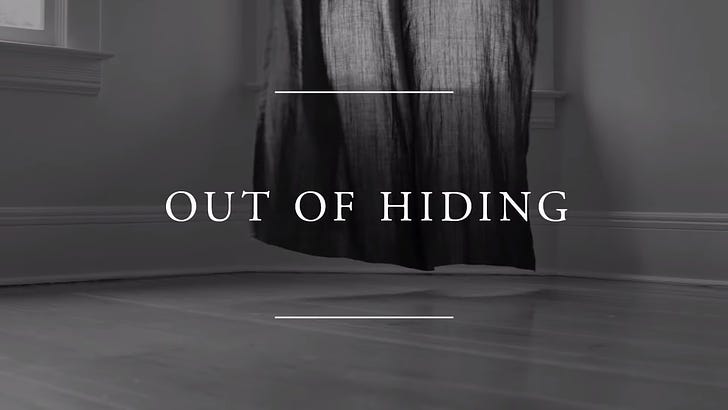“I heard people talking…”
”I can’t imagine why you would ever…”
”I just assumed you…”
Communication is at the heart of my vocation, and yet I feel misunderstood, almost daily. Recently, someone passed on what another person said about ‘my’ ministry, and I felt the sting of being misunderstood. Don’t they know me? Doesn’t my long track record count for anything? Doesn’t what they said about me, feel inconsistent with the me they actually know? Why wouldn’t they come and ask me—get clarity from me? Being misunderstood is, probably, the most common experience of shame—of unbelonging. Feeling unknown, unloved and even unlovable.
Being misunderstood feels lonely, like being put outside or on the other side. I can feel my head sinking, and my eyes diverting, somatically withdrawing from the conversation or the community. Or other times, I get louder and make myself bigger to really try to get my point across. Which makes matters worse—now I feel misunderstood and mad. Walter Trobisch writes,
Did you ever hear the story about the lawyer who asked one of his fellow attorneys to represent him in a court case? He had worked out his defense, and all his friend had to do was read it at the trial. In the margin at the fourth point he had scribbled, “Raise your voice and pound on the stand when you read this. It’s the weakest argument.1”
I wonder how much of our epidemic of loneliness is billions of people simultaneously feeling misunderstood. The news stations and politicians have no motivation to help us actually understand one another. Snap and surface-level analysis and attending judgment are like hits of a drug. Who cares what red-state blue-collar angst sounds like. Who cares what blue-city urban rage sounds like. I already know why so-in-so did thus and such. Don’t complicate the rush I get from rushing to judgement. CNN news helped me interpret Rich Men North of Richmond in the most uncurious ways. Fox News helped me make snap judgments about The Barbie Movie. Actually listening with the ears of my heart made me want to sit down with Oliver Anthony and Greta Gerwig and ask them some follow up questions. But, it would be less complicated to live in misunderstanding.
What can we do when we feel misunderstood?
Look around instead of down. We feel lonely, but we are not alone. Even lepers have other lepers. There is a fellowship of the misunderstood, and it is not a small company. Look over at the apostle Paul, misunderstood by the Corinthian church so severely as to warrant a whole epistle (2 Corinthians). Paul himself took comfort by the misunderstood Messiah—Jesus. He wrote to the Corinthians, “Since you seek proof that Christ is speaking in me. He is not weak in dealing with you, but is powerful among you. For he was crucified in weakness, but lives by the power of God. For we also are weak in him, but in dealing with you we will live with him by the power of God.” Paul also says that part of knowing Jesus is sharing “fellowship in his sufferings." (Philippians 3.10). When we feel misunderstood, you don’t have to look far to find Jesus. Even after his whole ministry, betrayal, passion, death, and resurrection, Jesus’ closest friends misunderstood him (Acts 1.6)! Look around instead of down—you are in good company.
Look out instead of in. Looking “in” means going deeper into our wormholes, our algorithms, our vacuous safe-spaces where our biases are confirmed, our resentments stoked, and our offenses are rehearsed. Saint Francis felt the sting of being misunderstood by his father. When it drove him deep in to himself, he felt unsure, unsettled, and insecure. When his orientation changed, and he walked more freely, he was able to lead us in the prayer attributed to him, “O divine Master, grant that I may not so much seek to be consoled as to console, to be understood as to understand, to be loved as to love.” People might not give us the grace to seek to understand us, but we can seek to understand. They might not ask us follow up questions, or take the time to pay attention to what we are really saying, or meaning, or doing. But, we can. One of the simplest follow up questions is, “tell me more.” Or, “I want to understand what you are saying…believing…valuing.” Or, “I don’t want to walk in presumption—I want to know your heart.” Or, “I can tell there are some strong feelings or convictions there—will you share them with me?” Curious compassion helps us look out instead of in.
Walter Trobisch. The Misunderstood Man. IVP. Downers Grove, IL. 1983. Page 17.




Thanks Nathan for your insight. Reading Francis' prayer is a wonderful reminder that this issue is not unique to us. Assumption, presumption, and bias is endemic.
BTW, this might be confirmation bias but I will say it anyway. You are the best. I reflect on the teachings of the past 15 years and they have been solid and solidly backed up with a life that exemplifies Christ. I like what you said in the past about visitors comments regarding TLC... "There is no hidden agenda." What you see on the surface is the same through and through. That comes from a pastor who is listening to and looking for the Lord and a flock willing to hear and follow by applying what they learned, integrating it into their lives. Even if is just one person, me, (I know there are more) you have had a profound life changing effect.
Walking in a life time of misunderstanding has brought me alongside an understanding God.